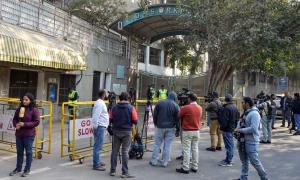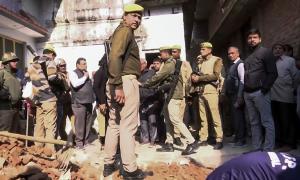Virtually rejecting India's contention that those accused in the Mumbai attacks be extradited, Britain has said it supports their prosecution in Pakistan as they have 'broken the law' of that country.
British Foreign Minister David Miliband said that there is evidence about involvement of Pakistan-based people and Islamabad should follow its commitments with actions.
"We will support their prosecution under Pakistani law, because they have broken the law in Pakistan. Its Pakistani law they have broken as well as international decency and common sense," British Foreign Minister David Miliband said during an interview.
He was responding to a query about New Delhi's demand that those accused of terrorist acts in India should be handed over to face trial in India.
On the dossier of evidence given by India to Pakistan, he said, "We have absolutely no doubt about the origin of the attack in Mumbai in November. The origins are in Pakistan."
Noting that there have been some detentions in Pakistan, Miliband said, "They should now lead to successful prosecutions. We believe the evidence is there."
Asked about the evidence, he said, "We have our own evidence that we have shown to Pakistani authorities and we believe that is the right evidence on which to proceed."
He said it was critical that "the words of the Pakistani government which are commitments" should be followed through into action.
When asked why those accused of terror in India should not be handed over to New Delhi like Khalid Sheikh Mohammed handed over by Pakistan to US, Miliband said "I won't go into constitutional position in Pakistan. What is important is those accused of heinous crimes should feel the full force of the law, whether in India or in Pakistan."
He said the Pakistani authorities have detained these people and "if there is evidence, they should be prosecuted. I say there is evidence, let them be prosecuted and if they are found guilty let them be punished."
The British Foreign Minister said he was in Pakistan on the day Mumbai attacks took place. "We had good words from Pakistani authorities that need to be translated into action."
"Indians don't want words. They want action. We support that position," said Miliband, who has met Prime Minister Manmohan Singh and held talks with External Affairs Minister Pranab Mukherjee and Home Minister P Chidambaram.
He talked about 'short-term and medium-term actions' that Pakistan needs to take.
"Short term action -- find the culprits, if found guilty, punish them take action through the courts. Medium-term action - root out the terror networks which pose threat not only to India but to the fundamentals of Pakistani state as well," he said.
Noting that terrorism has taken the life of former Pakistan Prime Minister Benazir Bhutto and many other Pakistanis, he said "they (Pakistan) need to do it for their own good."
He noted that "the Pakistani government had a policy towards the LeT (Lashkar-e-Taiyba) under the previous regime of President (Pervez) Musharraf. I think its very important that approach is changed."
When referred to Prime Minister Manmohan Singh's contention that Pakistan is using terrorism as an instrument of state policy, he said, "I have no evidence of Pakistani state directing terrorist activities and I will never make that claim without that evidence. What I know is Pakistan has a very serious terrorism problem."
Asked whether UK would impose sanctions on Pakistan if that country fails to properly punish those behind the Mumbai attacks, he said, "I don't think punishing Pakistani people with economic sanction is going to induce any sort of change."
He said the UK will "use all appropriate mechanism to make a difference" but made it clear that military approach will not help. "There is serious need for reform from within Pakistan," Miliband said.
On the Pakistani proposal for joint investigation, he said the two countries should cooperate "but we are not for any particular version of how to cooperate".
Miliband also disfavoured appointment of a special envoy by the US on Kashmir as has been speculated; saying India and Pakistan should be allowed to settle it bilaterally.
"It (Kashmir) is a bilateral issue...That is not in our policy. We felt composite dialogue between India and Pakistan is the right way forward. Our position has been the bilateral track is a good track and it should continue," he said.








More from rediff